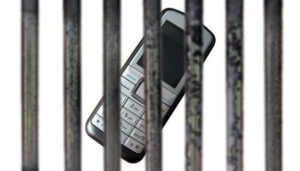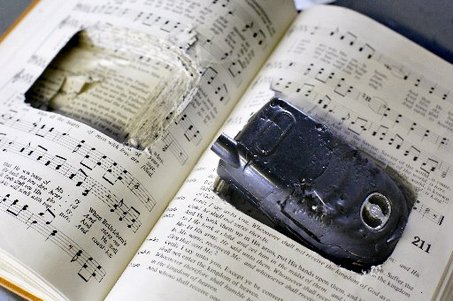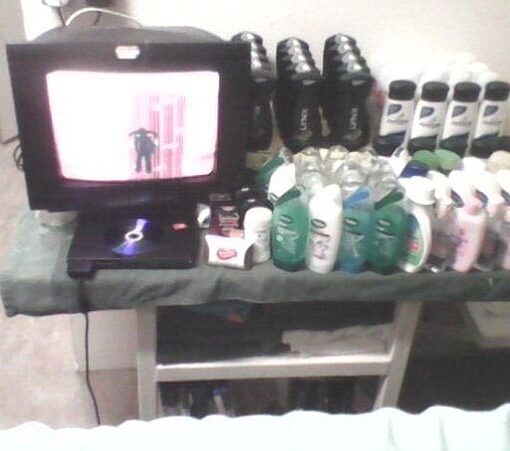 An interesting article on the use of electronic devices to aid in managing and controlling prisoners. According to the prison warden, “It’s a way of managing them. When an inmate gets idle, they start fighting. Allowing prisoners to own entertainment devices gives the guards something to take away if a prisoner misbehaves. If there’s a rule violation, the first thing we do is take away their property.” Given that most prisoners seek contraband cell phones to be able to stay in contact with their family and loved ones, providing a secure cell phone solution would offer the same behavior management opportunity.
An interesting article on the use of electronic devices to aid in managing and controlling prisoners. According to the prison warden, “It’s a way of managing them. When an inmate gets idle, they start fighting. Allowing prisoners to own entertainment devices gives the guards something to take away if a prisoner misbehaves. If there’s a rule violation, the first thing we do is take away their property.” Given that most prisoners seek contraband cell phones to be able to stay in contact with their family and loved ones, providing a secure cell phone solution would offer the same behavior management opportunity.
When RCA introduced its first television, the set was encased in clear Lucite, so visitors to the 1939 World’s Fair in New York could see the electronic innards and walk away confident that the sound and video were not a mere trick.
Decades later, the venerable electronics company resurrected clear-case televisions for a different purpose: to ensure prisoners could not hide contraband in their cells. And though RCA has dropped out of the market, prison cells in Maryland and other states still are filled with the unusual TVs made by other companies.
Televisions, personal music players and video game systems — all must be see-through under the regulations of most Maryland prisons — have become an important tool for wardens. Giving prisoners something to occupy their minds while in the cells, and connecting them to the outside world, can reduce tensions among inmates and decrease the chance of guards being caught in the middle of a fight.
“It’s a way of managing them,” said Bobby Shearin, warden at North Branch Correctional Institution, the state’s maximum security facility in Cumberland. “When an inmate gets idle, they start fighting.”
Inmates like to watch the news and sports to stay informed, he said, and television schedules help them create a routine.
The younger generation of inmates Shearin oversees have grown up glued to television and video games, he said. More than 60 percent of Shearin’s inmates, many of whom are serving long sentences, have televisions and more than 30 percent have video game consoles.
Tyrone Johnson, a 47-year-old Baltimore native, began a life sentence at Jessup in 1997 for first-degree murder. He has gone through several sets during his time locked up; most recently he had to buy a television that was equipped to handle the digital transition in 2009.
“Having a television, you [are] still outside,” Johnson said. “You can keep up with the world.”
Prison officials are wary of anything coming into their facilities that may harbor prohibited items. Julie Reynolds, a customer service supervisor for the California-based prison supply company Walkenhorst’s, said she’s even seen a cellphone smuggled inside a jar of peanut butter.
While letting electronics into prisons does increase the chances that contraband can be smuggled into or hidden in cells, clear-case electronics make it simpler for guards to perform inspections.
“If we can’t get them clear,” Shearin said, “then we’re not letting them in this place.”
Contraband, particularly cellphones and weapons, is a serious problem in correctional institutions and for wardens, the fewer places that inmates can hide items, the better. More than 20 people, including three Baltimore men and a man from Gwynn Oak, pleaded guilty in federal court this spring for racketeering that stemmed, in part, from their use of cellphones behind bars to coordinate crime.
Stewart Walkenhorst’s company makes clear TVs under the brand name Hiteker and sells about 6,000 sets per year. “It’s a small market,” he said, adding that because it’s so expensive to set up the manufacturing tools for clear encasements, “you don’t have the big majors chasing it.”
Several catalog companies, like Walkenhorst’s, provide secured direct mail to prisons of many clear electronics, from beard trimmers to typewriters, said Warden Tyrone Crowder, who runs the Maryland Reception, Diagnostic and Classification Center, a Baltimore facility at which inmates are held until they are transferred to a permanent location. Company employees, who have undergone background checks, pack the products and they’re not handled by anyone other than mail carriers until they arrive at the facility.
“Facility by facility, as we start working with them, gives us the rules they go by,” said Reynolds. She said that the company works with 19 facilities in Maryland and each one has slightly different rules about what items can be purchased by inmates.
In spite of these precautions, allowing inmates to have clear televisions does not eliminate security problems. Although all Maryland prisons limit TVs in cells to 15-inch screens or smaller, the televisions themselves can be used as weapons.
Last month the state’s attorney for Allegany County brought first-degree murder charges against Michael Rodell Boyer, 37, a Baltimore-area inmate who is serving a sentence for armed robbery and accused of bludgeoning his cellmate with a television.
Crowder said the ability to purchase entertainment electronics by mail is a privilege for the 64 inmates who are housed long-term in his facility — a privilege that can be taken away.
Inmates in his facility work within the prison, doing jobs like cleaning and maintenance, he said, and make between 90 cents and $1.20 per day depending on the skill required. They can use this money and money given to them by family members — never taxpayer dollars — to buy items for their cells, he said.
“Every year, we allow inmates to order a package,” said Crowder, noting that inmates are given the opportunity on a rolling schedule based on the “anniversary” of their entry into the facility.
Some inmates save their wages for months to have enough money to buy catalog items, Crowder said, and televisions are among the first things inmates will purchase, after food and clothing. He said about 85 percent of his long-term prisoners have televisions in their cells.
Crowder said allowing prisoners to own entertainment devices gives the guards something to take away if a prisoner misbehaves. “If there’s a rule violation, the first thing we do is take away their property.”
Items taken from a prisoner are not kept in the facility, Crowder said. Property is sent to family or friends for safekeeping, he said.
Once the item leaves the facility, it has been compromised and will not be returned to the prisoner, he said. That means that the inmate must start the process of saving — and waiting for their yearly package — all over again, Crowder said.
- Blockchain System for Compliant Inmate Transactions - March 4, 2025
- Securus Gets the Signal, Eleven Years Later - August 23, 2024
- Multi-Blockchain System for Inmate Forensics - April 2, 2024




